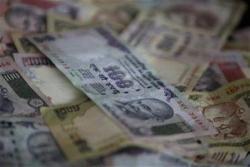India is lagging behind several countries in per capita income due to different levels of development and various other factors, Parliament was informed on Wednesday. "Yes... India continues to be a developing economy," Minister of State for Parliamentary Affairs and Planning Rajeev Shukla told Lok Sabha in a written reply.
"Yes... India continues to be a developing economy," Minister of State for Parliamentary Affairs and Planning Rajeev Shukla told Lok Sabha in a written reply.
He was responding to a query on whether the country is lagging behind several countries in per capita income.
Per capita of income is a measure of the amount of money that is being earned per person.
The Minister said the reasons for differences in the per capita income of different nations can be attributed to the levels of development besides other factors such as natural resource endowments, economic policies, political stability, differences in skills and technologies, population level etc.
India's per capita GDP on Purchasing Power Parity (PPP) basis was $3,403 in 2010 and is estimated at $3,662.69 in 2011 and $3,851.31 in 2012, he added.
The Central Statistics Office has been compiling estimates of rural and urban break up of per capita net domestic product (NDP), for the base years of National Accounts Statistics (NAS)
"The latest base year is 2004-05. The per capita income at current prices for the year 2004-05 is estimated at Rs 16,414 in rural areas and Rs 44,172 in urban areas."
The per capita net national income rose by 5.2 per cent while wholesale price index based inflation was at 8.9 per cent in 2011-12.
In 2010-11, per capita net national income grew by 6.4 per cent against a WPI inflation rise of 9.6 per cent. In 2009-10, it was 6.6 per cent and 3.8 per cent respectively.
To a query on measures being taken by the government to improve growth momentum and contain inflationary pressures, the Minister said: "On the growth front, steps have been taken to increase Foreign Direct Investment which would contribute to both greater capital inflows and over the long run, higher productivity thereby inducing growth."
Measures have also been taken by the RBI to contain inflation, he added.
"The tight monetary policy followed by RBI has the tendency to typically operate through compression of demand in the short run in order to contain inflation," Shukla said.











 © 2025
© 2025